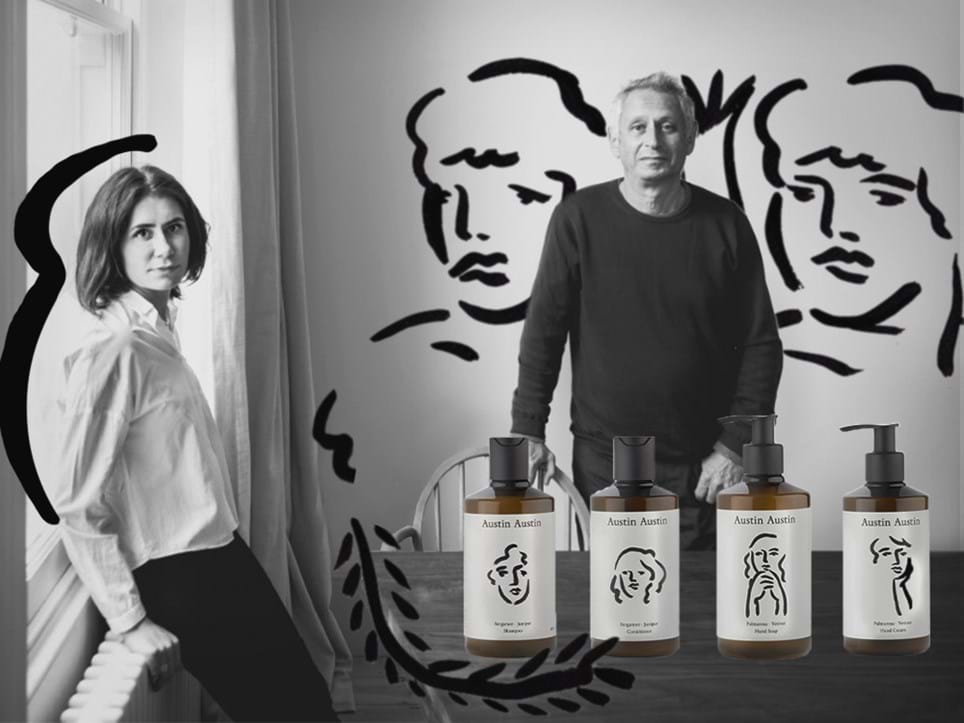There's something quite intimate about looking in someone’s bathroom cabinet, a bit like knowing their middle name.
This might be because bathrooms, the private space in which we get ready to go out into the public world, have an element of the ‘sacred and profane'. And the bathroom cabinet therefore becomes a sort of microcosm of this negotiation between the interior and exterior, our self and others.
That's why should one find an Austin Austin bottle in such a space, you are assured that the person amongst whom's affairs you are snooping is a someone of fine taste. Austin Austin is a Norfolk-based organic skincare company founded and run by father daughter duo Richard and Bessie Austin. Their products are all certified by the Soil Association and COSMOS too, making them not just feel good, but also “this means,” Bessie explains, “that each ingredient, each process in the production from farm to shelf, and every piece of packaging is inspected, assessed and finally approved by Soil Association inspectors. Their mission is to ensure that we protect our planet, our soil and the wildlife and environment that relies on it.”
We love how they do it, but we're also a sucker for great packaging. Enough so that one might look in someone else’s bathroom cabinet and see a little bottle of their body cream and then decide to write an article about why cupboards are a material metaphor for the id and ego (ahem).
Bessie Austin's time at art school was spent producing work that “focused on the relationship between object and the interior space” and has, she said, brought “some of this consideration to my desk at Austin Austin.” Each of their products are made with a blank space on the front to be designed in collaboration with an artist. Their first of these collaborations was with London-based artist Christain Newby, who produced the six initial line drawings on Austin Austin’s current packaging.
Bessie explains that their “work with artists is more about our individual interest… I firmly believe in the value of having beautiful and carefully crafted objects as part of day to day life.” The artist, Newby, has described how his work is influenced by his interaction with his direct environment, the domestic setting. It is a kind of reactive phenomenology, whereby he attaches his “ideas to something that doesn't just exist within the realm of speculation but [in] my habits and movements and ways of viewing and interacting with the world around me.”
Interacting with the world around them shapes, too, how the Austins run their business. Bessie explains that her father, “Richard, is absorbed with a wide range of current thinking on how small companies can best do business in the most respectful way for the environment. He has worked with Greenpeace, been a campaigner against GM agriculture, is a Tibetan Buddhist and helped establish the wholefood movement in the UK.”
She herself is a new mother to a six-month-old daughter, which Bessie says has made her realise the difficulties of being a young woman running a newly established, independent company: “referencing the original organic movement, which was part of a wider alternative culture that embraced modern feminism, I notice how far we have come as women in the business world, and also how far there is still to travel.” For her, the making of Austin Austin has been “a very personal project… I grew up surrounded by organic at home. And I wanted to create a collection of products that encompassed these principles and also met my own criteria for high performance and functional beauty.”
It is this, probably, that makes Austin Austin so interesting: this point of meeting between function and beauty, ethos and aesthetics. And it is also possibly why looking in people’s bathroom cabinets is so thrilling.
Broad Strokes









